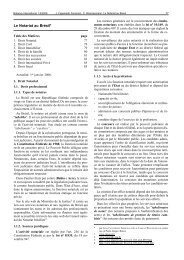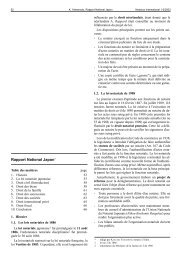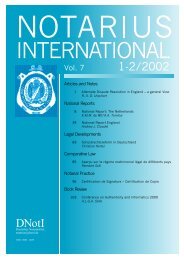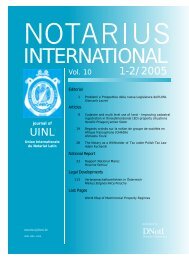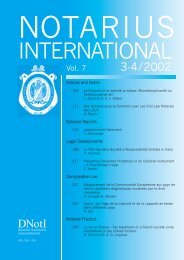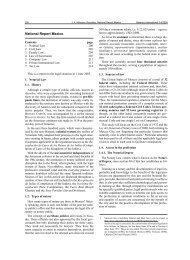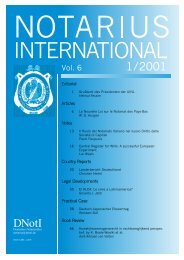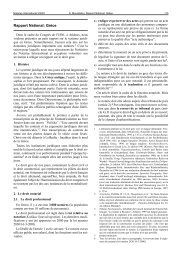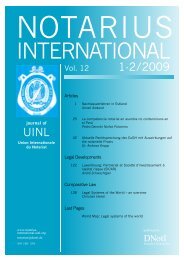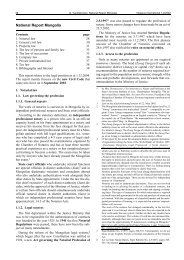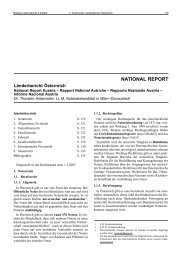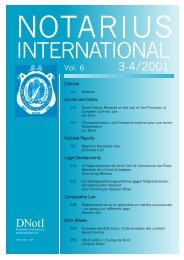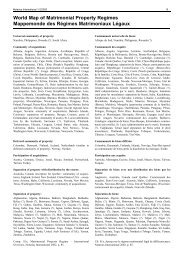Create successful ePaper yourself
Turn your PDF publications into a flip-book with our unique Google optimized e-Paper software.
<strong>Notarius</strong> <strong>International</strong> 3-4/<strong>2005</strong> J. A. Márquez González, National Report Mexico 205<br />
18 (article 30 section II), as does the Civil Code of Guerrero<br />
(article 412). We should point out that article 157 of<br />
the Civil Code of Baja California Sur imposes a minimum<br />
age of 18 for the man and 16 for the woman.<br />
If necessary, dispensations of age can be granted for serious,<br />
justified causes. This occurs, in any case, with minors<br />
who, in order to marry, require the consent of their<br />
progenitors or, if their parents are not living, of their<br />
grandparents. The law also provides that, in the absence<br />
of parents or grandparents, consent must be given by<br />
guardians and, in extreme cases, by the judge of the family<br />
court.<br />
3.3. Divorce<br />
3.3.1. Administrative divorce<br />
Article 266 of the CCFD state specifically that, “Divorce<br />
dissolves the marital union and renders the spouses<br />
free to enter into another union”. The simplest, quickest<br />
way in which a divorce can be obtained is known as<br />
an administrative divorce.<br />
The marital union may be dissolved through a simple<br />
declaration by both spouses when they are both of legal<br />
age and have no children below the age of eighteen and<br />
have no assets or have liquidated the property held jointly<br />
by the spouses, if any (article 272).<br />
3.3.2. Judicial divorce by consent<br />
The second type of divorce is somewhat more complex.<br />
It presupposes that the spouses wish to divorce, but<br />
do not fulfil the conditions provided in the first paragraph<br />
of article 272, i.e., they are not yet of legal age or they<br />
have children or they have not liquidated the property<br />
held jointly by the spouses.<br />
If any of these situations apply to the spouses, they are<br />
obliged to submit an agreement relating to these points to<br />
the family court. When approval has been obtained, the<br />
procedure continues on a routine basis.<br />
It is important to specify that both procedures, both the<br />
administrative procedure (article 272 of the CCFD) and<br />
the judicial procedure for prior approval of the agreement<br />
(article 273 of the CCFD) cannot under any circumstances<br />
be requested until one year has passed from the celebration<br />
of the marriage, whereby the legislator ensures<br />
that it is not the result of a passing whim or an impulsive<br />
decision by the spouses.<br />
3.3.3. Divorce due to a serious cause<br />
Unlike the previous two types, the third and final type<br />
of divorce in our law takes place due to the existence of<br />
a serious cause, as provided in detail in article 267 of the<br />
CCFD, and naturally does not entail the consent of both<br />
spouses.<br />
The procedure for requesting this type of divorce is also<br />
provided in the Code of Civil Procedure for the Federal<br />
District, though in a different section since there is no<br />
specific procedure for it, it being processed through the<br />
procedures of ordinary proceedings, which are governed<br />
in articles 251 et seqq. of that same legal text.<br />
3.4. Marital property regime<br />
The Civil Code expressly provides that a marriage<br />
contract must be made, according to the regime for property<br />
held jointly by the spouses or separation of property<br />
(articles 98, 178 CCDF).<br />
3.4.1. Property held jointly by the spouses<br />
Depending on the matrimonial contract, this regime<br />
may include any property owned by the spouses, not only<br />
at that moment but also any property that they may acquire<br />
in future, is included in a fund of property. In the<br />
marriage contract the spouses may define which property<br />
is jointly held. In the case of immovable property being<br />
made joint property, the contract that governs the<br />
joint property must be executed in public deed before a<br />
notary and must also be entered at the Public Land<br />
Registry for them to take effect vis-à-vis third parties.<br />
As a general rule in most states, unless the spouses<br />
have agreed otherwise, the joint property comprises all<br />
property acquired by one or both of the spouses after the<br />
date of marriage (community of acquisitions). However,<br />
property acquired by a gift to one of the spouses only or<br />
by succession or testamentary legacy or by the whim of<br />
fortune, remains separate property of the said spouse (as<br />
well as property acquired prior to the marriage) (article<br />
172 CC Chihuahua, article 182 quintus CCDF, articles<br />
303-306 CC Jalisco, article 207 CC Oaxaca, article 338<br />
CC Puebla, articles 735-738 CC Quintana Roo, articles<br />
196-201 CC Tabasco, article 173 CC Tamaulipas, article<br />
172 CC Veracruz).<br />
3.4.2. Separation of property<br />
In the regime of separation of property, the spouses retain<br />
ownership and administration of the assets that belong<br />
to them under the contract, along with any income<br />
that may be generated from them. This is precisely the<br />
opposite situation to property held jointly by the spouses.<br />
3.4.3. Legal presumptions<br />
In practice, an increasing number of couples prefer the<br />
regime of separation of property, although it is true that<br />
previously most spouses chose to hold their assets jointly.<br />
It is also clear that an important reason for this is that<br />
when no marriage contract is executed, many civil codes<br />
in the Republic establish the legal presumption that the<br />
property regime is that of property held jointly by the<br />
spouses. This is, in fact, the general rule specified in the<br />
following civil codes: the Civil Codes of Chihuahua (article<br />
165), Morelos (article 141), Nuevo León (article<br />
178), Puebla (article 338), Quintana Roo (article 719),<br />
Tabasco (article 180) and Veracruz (article 166). The presumption<br />
is of property held jointly in the following legal<br />
systems: Aguascalientes (article 209), Jalisco (article<br />
282), Oaxaca (article 206), Sonora (article 270) and Ta -<br />
maulipas (article 172).<br />
Furthermore, the following codes expressly contemplate<br />
a presumption which is directly contrary to this:<br />
Campeche (article 189), Guanajuato (article 176), Guerrero<br />
(article 437), the Federal Code of Hidalgo (article



